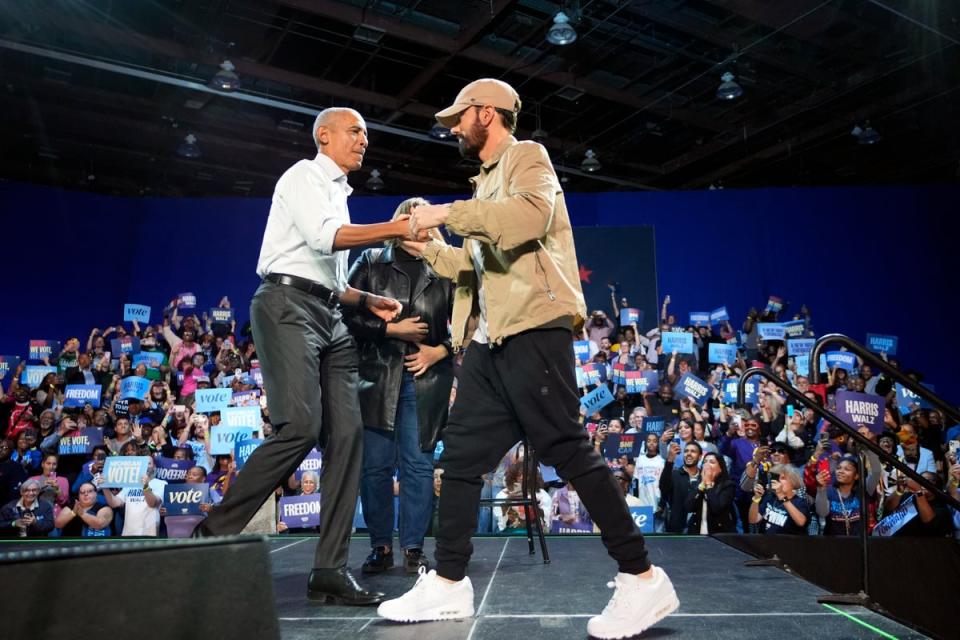Why celebrity endorsements don’t work as Clooney, Taylor, Beyonce and Oprah fail to win it for Harris

The combined support of celebrities such as George Clooney, Taylor Swift, Beyonce and more couldn’t help Kamala Harris secure the presidency in Tuesday’s election.
A stream of A-listers from Hollywood and the music world all threw their weight behind the Democrat during the bitterly-fought campaign, in the hope that their millions of supporters and followers would move the needle.
But not even the endorsement of Swift seemed to make any difference. Nor did the backing of Katy Perry, Lady Gaga, or Ariana Grande. Harrison Ford warned of the threat to democracy to no avail.

Lebron James, Bruce Springsteen, Oprah Winfrey, Jennifer Lopez, Lizzo, Eminem, and Arnold Schwarzenegger, a former Republican governor of California all spoke out for Harris. Julia Roberts and Robert De Niro similarly appeared to have little sway with the public.
Charli xcx tweeted “Kamala IS Brat” in July and the Harris campaign even adopted her album’s color scheme on social media.
But in the end, none of it was enough to defeat the new and diverse coalition of voters supporting Donald Trump. The question, as Democrats search for answers about what went wrong, is why?

Hollywood Reporter writer Seth Abramovitch told The Guardian that the audiences of these celebrities, apart from Swift, “were already inclined to vote for Kamala.”
Swift manages to appeal to both sides of the aisle, but not to the voters who swung the election for Trump this time, namely Latinos and Black men.
Arizona State University professor Margaretha Bentley told the paper that “celebrity endorsements can increase civic engagement and voter registrations” but “it has not proven to have a direct impact on how people make their voting decisions.”
“Voters may do more research after a celebrity endorses, but they will vote based on their own values and not necessarily the values of the celebrity endorser,” she added.

The site vote.gov had 405,999 visitors in the day following Swift’s endorsement in which she shared the URL.
Ashley Spillane wrote the Harvard study Celebrities Strengthening Our Culture of Democracy, which found that endorsements may increase “nonpartisan civic engagement” but it’s unclear if it leads to a better result for the endorsed candidate.
Bentley says the research has not been able to answer the question if there’s any point in seeking out an endorsement.
A 2008 study found that Winfrey’s endorsement of President Barack Obama added about a million votes for him. But that was then.

YouGov found in a poll after the Swift endorsement that just eight percent of voters said they were “somewhat” or “much more” likely to back Harris while 20 percent it made them less likely to support her.
New York University professor Laurence Maslon told The Guardian that “endorsements have probably always done more for the celebrity than the person being endorsed.”
But Maslon also said that “to have the most famous black female singer in the world not endorse Harris probably would have been a big negative, just by implication.”

He adds that the only time a celebrity endorsement makes any difference is when the candidate themselves is a celebrity, pointing to 1940s film star George Murphy who became a California senator. Subsequently, Schwarzenegger and the late President Ronald Reagan both became governors of the Golden State, both for the Republican Party.
Trump, meanwhile, skipped state-level politics altogether and went straight for the presidency as a Republican after previously having identified as a Democrat.
Democrats easily get the most celebrity endorsements, but if you’re a celebrity and want to run for office yourself, the Republicans may be the party for you.
Solve the daily Crossword

